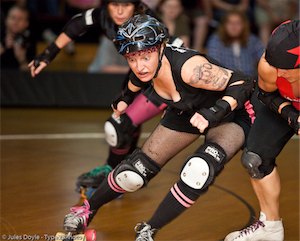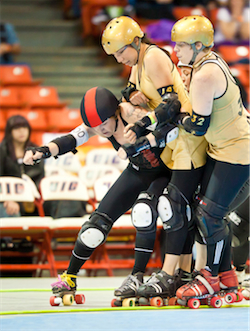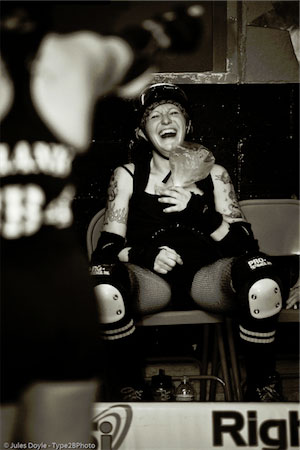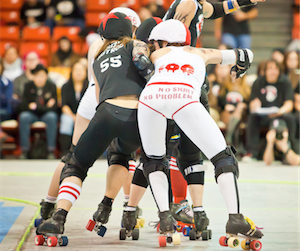July 2011 Featured Skater: Crackerjack
July 7, 2011
She's been rolling since 2004 and, since the beginning, has contributed to the massive growth and changes in the organization of women’s flat track roller derby. From founding a league, to three years as WFTDA President, over 100 games and many more pranks, she's been a leader, an inspiration, and a lot of fun through it all. Read on to learn more about Crackerjack…

Photo by Jules Doyle
Name: Crackerjack
Number: 100
League: I’m a Texas Rollergirl!
Teams you play for: Hotrod Honeys! (2008-present)
I’ve also played for the Texecutioners (Texas Rollergirls’ All Star team, 2009-2011), the Reservoir Dolls (Mad Rollin’ Dolls’ home team, 2004-2008), the Dairyland Dolls (Mad Rollin’ Dolls’ All Star team, Captain, 2005-2008), Team Awesome (first Battle of the Bank, etc.), and others…
What is your roller derby playing position of choice?
I used to be a 5-position All Star…I’m a retired jammer. I like playing the front and back, big dog protecting the pack.
What is your skate gear of choice?
- Wheels that don’t chip
- Boots that don’t fall apart
- Plates that flex where I want, and hold where I want
- Knee pads that don’t slip
What are some of your best/favorite moments in roller derby?
I have too many. It’s been an incredible 7 years!
Who are your derby heroes, and why are they your heroes?
Lucille Brawl, White Lightnin’, and Sheriff Shutyerpaio aka Helen Wheels.
Lucille Brawl is my sister, and the most incredible clutch player, the smartest strategist. White Lightnin’ got me wanting to play. She’d block girls like a train. Helen Wheels is – always has been – a total powerhouse. The can opener was originally named “the Sheriff” back in 2005.
Do you have a motivational quote?
Show ‘em the bait and hit ‘em with the fish!
What goes through your brain as you lace up your skates?
Don’t throw up. Cartwheels. RAARRR. Don’t throw up.
Do you have a theme song?
Crackerjack by Janis Martin.
Do you have any signature moves?
- Crazy eyes
- Four-inch Takeout
How did you come up with your derby name? Has there been a resolution to the controversy between you and a similarly named popcorn snack?
I named myself after a rockabilly song. I may be sweet and a little salty, but I’m not a snack. The case is still with the trademark board, and their lawyers are burning up lots of dollars to keep my name off a little video game.

Photo by Jules Doyle
Do you have any advice for girls who want to join roller derby?
Take on the biggest possible challenge in your league’s business operations, as quickly as possible, and forego all other pursuits in life until you succeed completely and leave a legacy for future leaders.
How would you describe your derby playing style?
I would say: Determined.
Opponents tell me: Annoying.
How did you get involved with roller derby?
My little sister Lucille Brawl started playing in Austin before the split, with BGGW. A couple of years after she started I saw the Texas Rollergirls in their first season, and I knew what I wanted to do for the next li’l bit. I founded the Mad Rollin’ Dolls in Madison, Wisconsin pretty much immediately.
If you don’t know about the split or timeline I’m talking about, you should watch Hell on Wheels.
Because of the cooperative and "family" focus of roller derby, new leagues in 2011 have so many resources available to help them through the early challenges. Based on your experiences founding the Mad Rollin' Dolls, what were some of the trials and tribulations of starting a roller derby team in the beginning of the resurgence?
I think it would be very…different to start a league now. There is so much policy to navigate and so many different opinions to consider.
In 2004 we made it all up as we went along. Literally. I give huge kudos to TXRG and Arizona Roller Derby for the advice they gave, but the atmosphere at the time was very independent. We were forging a new path, and no one would tell us how to do it. Each league made up its rules of play, policies, drills, marketing plans, everything. We had nothing in common but our common sense. And a love for underpants.
I think I would have a hard time starting a league now. On the other hand, I would have saved myself a lot of grief over every decision. I know that leagues that have been around for just a year or two now are way more skilled and safe than we were, because of the quality of resources available and the open-source culture of derby, and that’s the most significant achievement of the WFTDA so far, in terms of longevity of this sport.
How long have you been playing roller derby? And how long do you plan to continue playing roller derby?
Since July 2004. Till I’m broken.
What is your sports/skating background?
I was an ice speed skater in Madison as a kid, played sports all my life, lots of team sports and playing with boys.
What are some of your greatest roller derby accomplishments?
I like my record for pissing off the biggest threats and for jammer hating, but golly I’ve skated over 100 games, and I just don’t remember the ones where I do best – I’m too busy living it and watching the snot fly.
How about accomplishments off the track?
Well, I was WFTDA President for three years…
You have been a leader in women's flat track roller derby since the formation of the ULC. Can you please talk about your experiences as an active participant in the development and expansion of the WFTDA?
I’ve been involved in the ULC/WFTDA since 2004, I was an original board member, was the President for three years and am currently the Past President. I’ve been to every WFTDA meeting, I’ve handed out a lot of trophies, and pushed for league consensus on a thousand issues. I was technically the first WFTDA paid employee, Interim Executive Director, as I got Bloody Mary (Executive Director) and Toss’er Assout (Insurance Administrator) hired and onboarded.
Can you please talk a little about why and how the United Leagues Coalition (ULC) was developed? What was your involvement in the development of the ULC?
Once upon a time, the Arizona Roller Derby came to visit the Texas Rollergirls. It was, like, 2004BCE. When they were leaving, they talked about forming a Yahoo Group so that they could discuss the future awesomeness of the roller derby. At like the same time a day later, Hydra set up the United Leagues Coalition Yahoo Group, and Ivanna S. Pankin set up the Rollergirls Yahoo Group. They were each set up for a different purpose: the Rollergirls site was inclusive – for skaters and fans of banked and flat track roller derby. The ULC group was for developing flat track leagues, with the goal of everyone playing each other in interleague bouts.
I joined the ULC in May 2004. Well, I joined them both, but the ULC turned out to be the formative group. In the beginning, the organization was very loose. We were all brand new except Texas, and the basics were so simple: skate quads. Turn left. Fights are okay but don’t hurt anybody. Guerilla marketing, benefit shows, a rink, a speed coach to help you out, it all just fell together. We were preoccupied with our own formation, and proud of each discovery. But even before we knew what we were doing there was this competition with each other: bout more, bout first, bout better, be better. That’s what informed our choices and drove our speedy evolution, towards a point where we needed each other in order to keep growing.
All of a sudden by the end of 2004, there were 30 leagues not five, and it was time for us to get face-to-face to decide how we would work with each other.
We were all very autonomous back then, sharing best practices but creating independently. When it was so fresh, we didn’t think about goals and policies, we were busy exploring, and relished evolving in our own direction.
BTDubs, just to remind me how much else has changed: Yahoo groups were brand new, and it wasn’t unusual for a derby girl not to have a computer or cell phone.
How and why did the ULC become the WFTDA?
At the first meeting, in Chicago, we decided to become more than a loose association of leagues. We decided to form a non-profit, started debating names, and started creating the cultural and administrative compact of the WFTDA.
In many ways, we did it reluctantly. It was uncomfortable to give up control of what we had just begun to control ourselves. We weren’t sure we could relinquish our right to make our own decisions, even if it was for our own common good. Especially when the future was so hazy, and the leagues’ evolutions so divergent.
In 2004 there were about 30 original leagues just starting.
In 2005 we started playing together and realized we needed more policies and common rules.
In 2006 we officially set up WFTDA, moved off a Yahoo group and started building some serious organizational structure.

Photo by Jules Doyle
We did it, because we recognized how much stronger we were together than apart. We quickly realized our little differences were nothing in comparison with our common differences with previous conceptions of roller derby. We had been evolving separately, but we had this cultural cohesion, this conception of derby beyond the gender and socio-economic issues of its past – we shared a vision of a real future for this sport.
At the outset of the WFTDA, did you imagine the association becoming what it is today? In your opinion, what is the most surprising or unanticipated development in the WFTDA? What is the most exciting?
In terms of our fast growth, I’m not at all surprised at where we are in 2011. Thousands of volunteers have put in unimaginable hours, building this sport to where it is, and the strength of our mutual conviction drives us to keep making it better.
We came to this whole endeavor with such an unafraid ownership of the process. We never doubted we had a right to carve out our own space for our own roller derby, and for the culture it spawned. We just made it because we wanted it to be there.
The WFTDA’s commitment to a “by the skaters, for the skaters” philosophy has created a unique culture of innovation. Our burgeoning Apprentice Program and unmatched tournament quality are a reflection of our personal investment – every skater, official and volunteer.
Since you have attended every WFTDA annual meeting, can you please talk a little about how they have changed over the years? What, if anything, has stayed the same?
Oh the meetings!
They’ve each been a trial and a success, and each its own animal. A compare and contrast article is a whole ‘nother interview, probably best suited for Hellarad…
Each meeting was designed and executed in a discrete period in our evolution. The things that haven’t changed are probably the most important – we still have meetings with all representatives in one big room. We skate together. We make friends and schedule bouts and scheme in the best interest of the glorious future of roller derby. Everyone is an important person, no matter how many of us there are.
For the first few years we were getting to know each other and filling the vacuum – working together on projects designed to increase our viability, and actively making decisions about policy. Lots of exciting voting.
Now, we spend a lot of time in discussion about our growth and direction; we train new leagues and reps and referees; we have lots and lots of meetings while we have each others’ faces right there.
What does the WFTDA mean to you?
The WFTDA is a really special project, and a labor of love for derby, and for the players. We have stayed true to the philosophies of the modern derby revolution, while building a strong, stable organization. I love that we create our own destiny, and I love the energy when we all get together to discuss it.
What role(s) do you think the WFTDA will play in the continued growth of roller derby?
Grandmother, granddaughter, fluffer, favorite aunt, creepy uncle, best friend, ex-bestie, priest, empress and traitor. But always, champion of the best interests of the skaters and the sport, and thought leader among organizations of women, roller derby, safety, underpants, kittens and chicks, diversions, velocity-mass relations, and awesomeness.
Please discuss some of the most major changes in women's flat track roller derby you have witnessed during the time you have been involved.
2004: 5 leagues, 5 rule sets, USARS, one interleague bout.
2012: almost 1000 leagues, 1 rule set, employees, insurance, a million bouts every week.

Photo by Jules Doyle
Roller derby is growing at a rapid pace around the world. What are your predictions for the future of flat track roller derby (the next 5 years, 10 years)?
In summary, we will rule the world with our puckish charm and indelible spirit, all the planets will align to no schedule, except tournaments, in accordance with the whim of the WFTDA.
In 2012, we will head off the apocalypse, I’m not sure how yet.
The Amazon Derbygirls will be founded in 2014; they will block the WFTDA application of Derby Mars in 2017 – old grudge.
Kittens and baby chicks will spontaneously pack up in 2016, precipitating worldwide harmony.
In 2020 something might happen, it’s still very hazy.
How has your involvement in roller derby affected the way you live the rest of your life?
It has led to more pranking, generally. Also, more fearless exhibitionism than really necessary.
Anyone you'd like to take the opportunity to thank?
If I start on all the people I can’t stop…
But I have to thank Hydra, derby mama to us all. She was the original apprentice program – mentored every one of the earliest leagues and gave us support and confidence to get this thing off the ground.
Thanks to all who were passionate enough to create this legacy, and to all who are passionate enough to fulfill the dream.
Would you like to be the WFTDA Featured Skater of the month (or nominate one of your fantastic teammates)? If you are an active skater on a WFTDA full member league that has a dazzling derby career, please contact webmaster@wftda.com and let us know what makes you shine.
Real. Strong. Athletic. Revolutionary.